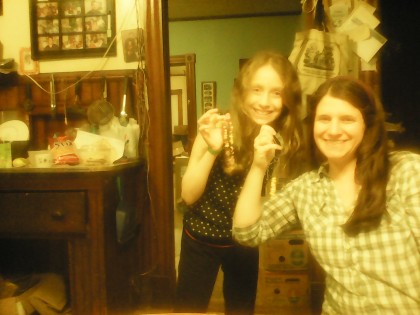In Praise of the Inefficient Care of Persons
Devra Torres | Oct 25, 2015 | 4 cmts

Last weekend, I travelled to New Hampshire to visit my parents, ostensibly to help my father and sister take care of my mother, who suffers (and that's the right word) from Alzheimer's. I didn't manage to be much help, but I came back with something to ponder.
My mother, who used to have a way with words like few people you've ever met, can hardly utter a coherent sentence these days. Two exceptions from this weekend: my sister and daughter and I were making necklaces out of Indian corn, and I reminded my mother that it was she who had taught me how to do that."In fact," I added, "You taught me pretty much everything I know."
"Well, that would be a little extreme," she replied, with perfect lucidity.
The second exception happened later, when she kept talking about lying down on the couch and then immediately heading away from it. I tried to steer her towards the living room. but when we got there, she had some trouble maneuvering her head around to where the pillow was. I wanted to help, and was ineffectually trying to find the right balance between coaxing and nudging her head in the right direction when she objected mildly, but with perfect clarity, "Listen, honey, take it easy, OK?" I had the sense that she was not just expressing annoyance with the head-nudging, but was trying to get me to understand something about how to treat people.
I've been a mother myself for a good quarter-century, so I'm used to tryng to help people who can't express what they want. Or who don't want what they should. Or who don't understand what they truly want. I can tell by a newborn's cry whether he's hungry or suffering from belly bubbles, even if he doesn't know which it is himself. I can determine when it's time to abandon tact and embrace coercion to save a two-year-old from the hard candy that she thinks would make her happy and I know would block her windpipe.

I'm familiar with (though I still haven't mastered) the art of knowing when to let your teenager get himself into something that's likely to end badly, and when to put your foot down. I knew all about teachable moments (and have been known to get a little carried away with them).
But this was different. In all of those cases, I'd be trying to show respect and love for people who aren't competent to handle things for themselves. It's clear to me that they merit such treatment simply because they're human persons, and especially entrusted to me. But there's also an element of pragmatism and concern for efficiency. When you're making judgments for a newborn, toddler, or teenager, you have in mind that someday they'll be making them for themselves, and you're training them for that moment. You're looking to equip them to take on the responsibility themselves--either by stepping in to prevent a fatality, so that they can even live to see an age of greater competence, or by letting them experience the natural consequence of their mistakes.
You're treating them with suitable respect, in accord with their dignity--but also because you figure it will WORK better that way, for them and for you.
This is different, though. There's no expectation that my mother will be shouldering the task of judging or fending for herself again. All of us who are trying to give her the help she now needs without disregarding her dignity are doing it just because she is who she is. No present or future abilities at all have anything to do with her being deemed worthy of anything.
Efficiency would dictate a different approach: more coercion, less explanation, less attention to anybody as a person.
But efficiency is overrated.


Comments (4)
Katie van Schaijik
Oct 26, 2015 11:40am
Yesterday the Gospel was the one about Jesus calling the children to himself and telling his disciples that unless we become like little children we cannot enter the kingdom of God.
I'm used to think of that passage in regard to a child's trust and dependence. But you remind me that there's another aspect too. Children are typically completely unconcerned with efficiency.
Devra Torres
Oct 28, 2015 11:55pm
Yes, that's almost the hallmark of childhood! Every time I'm trying to get my seven-year-old out the door, and he wants to stop the world and show me a cool leaf he found--or when I'm wrapped up in paperwork and my ten-year-old wants to show me a magic trick, it's one more check on my tendency to an "inordinate preoccupation with efficiency"--which I think I remember St. John Paul II calling the source of all kinds of trouble and evil, maybe even the primary source.
Nancy
Mar 11, 2016 3:15pm
This has been haunting me for a long time. I am a RN and work in the Emergency Dept. We have to go and go fast. It's such a struggle to get someone's top off to do an EKG in the 10 minutes from the sign-in time to EKG time that's required in case of chest pain. Especially in those with dementia. And that usually starts the visit off in a bad light and there is resistance for all that follows. And families seem to think, "you're the nurse, you put his shoes on" or whatever, even though they normally do it, they don't know and shouldn't have to care that I'm up to my eyes in alligators. It feels like 10 minutes to get that belt buckled just right. I leave work in tears dealing with dignity vs getting stuff done, I'm way too sensitive or aware about preserving dignity or something, I don't know what to do. Well, I sure pray a lot at work, I'll say that.
Devra Torres
Mar 14, 2016 11:17pm
That is a hard situation, but because it's your job, it's not as if you have the option to go as slowly and sensitively as you would like to. My sense is that it's better for the patients to have someone caring for them who's aware of what their dignity requires, even though you don't have the authority to decide to act on what you see. And then of course it it's a medical emergency, like getting an EKG done, you need to go quickly, an it's not an offense to dignity to move fast. Nursing is so hard!